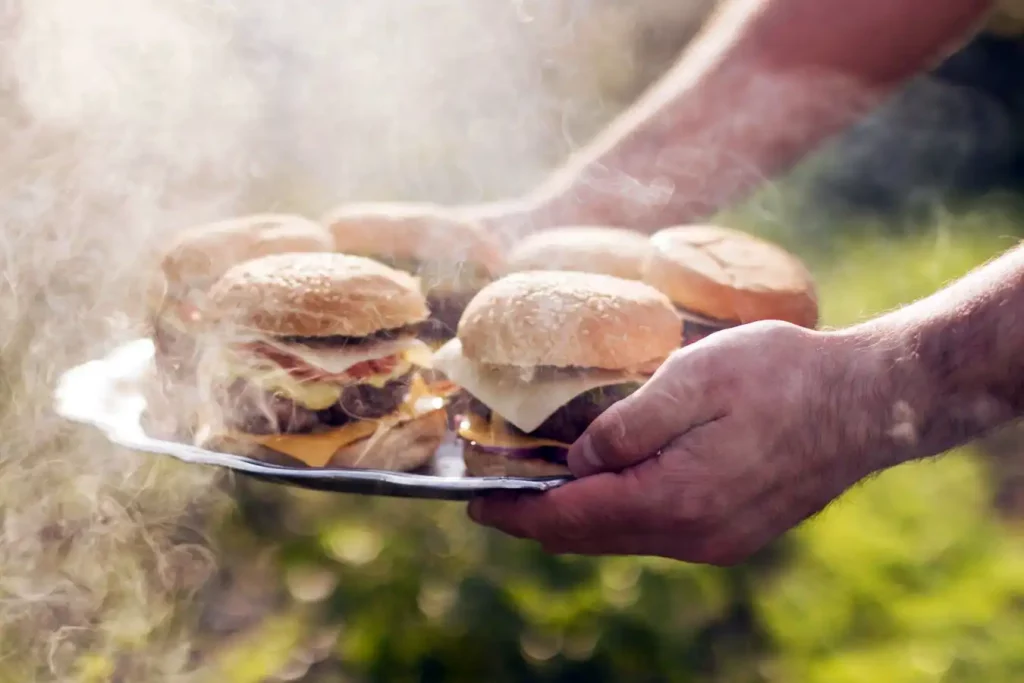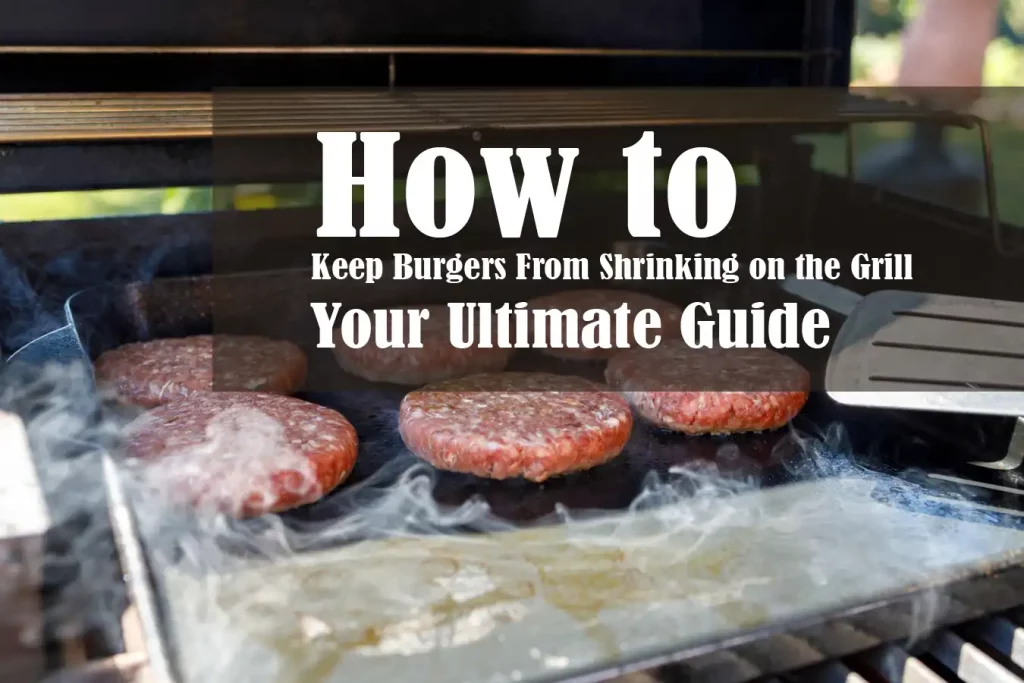Looking for ways on “how to keep burgers from shrinking on the grill”?
Well, you’ve come to the right place!
My name is Ovi Tanchangya, a passionate blogger and outdoor enthusiast, here to guide you through a culinary journey.
This article is designed to equip you with insider tips and tricks that will leave you grilling like a pro, ensuring your burgers stay plump and juicy.
Get ready for some exciting grilling techniques that are not only easy to grasp but will also amp up your backyard barbecue game!
Expect practical advice, personal experiences, and a touch of that irresistible campfire charm as you dive into this ultimate guide.
Understanding Burger Shrinkage
Burger shrinkage, although a common enemy of home cooks and grill enthusiasts, isn’t magic or a personal vendetta from the grilling gods. It’s pure science.
Explanation of Why Burgers Shrink When Grilled
Have you ever observed a burger patty shrinking and thought, “Why does this happen?” It’s a great question, and it all comes down to the meat’s composition.
Burgers are primarily made of ground meat, usually beef, containing both lean meat and fat. The lean meat is where the protein lives, and the fat, well, it gives your burger that irresistible flavor and juiciness. When you cook the burger, two key things happen: the protein tightens up and the fat melts away.
Imagine your burger patty as a party of protein fibers just hanging out, all relaxed and stretched out. As the heat from your grill starts to kick in, these protein fibers get startled. They tense up and tighten, much like how your muscles react to a cold splash of water. As they tighten, they squeeze out the water and fat that was making your patty plump, causing it to shrink in size.
The Role of Fat, Heat, and Cooking Techniques in Burger Shrinkage
Let’s delve deeper into this science of burger shrinkage. The fat content in your burger plays a significant role in shrinkage. The higher the fat content, the more shrinkage you’ll witness because fat liquefies and drains off during cooking.
The heat of your grill also influences shrinkage. Higher heat can cause the proteins in your burger to contract more rapidly, leading to more water and fat being expelled and, therefore, more shrinkage.
Finally, your cooking techniques can play a part too. For instance, overworking your burger patties when you form them can make the proteins more likely to contract and tighten, leading to more shrinkage.
Preparing Your Burgers for Grilling
Preparation is key when it comes to minimizing burger shrinkage. The meat you choose, how you handle it, and even the temperature at which you cook it can all influence the size of your burgers after grilling. Let’s discuss these important aspects in detail.
Choosing the Right Meat for Minimal Shrinkage
As tempting as it might be to go for the leanest ground meat you can find, doing so may not bode well for your burgers. Remember, fat equals flavor and also helps maintain the shape of your burger. Aim for ground beef that has a fat content of around 20%. This fat ratio provides enough moisture for a juicy burger without causing excessive shrinkage.
If you prefer a leaner burger, consider adding a binder like breadcrumbs and egg. This can help retain the moisture and prevent shrinkage.
The Importance of Cold Patties in Reducing Shrinkage
Keeping your burger patties cold until they hit the grill can be a game-changer. When the patties are cold, the fat inside them is solid. This gives you a bit of extra time before the fat starts to render and drip away when you start cooking.
So, once you’ve formed your patties, place them in the refrigerator for at least an hour before you plan to start grilling.
How to Properly Form Burger Patties
The way you form your burger patties can influence their final size. It’s best to handle the meat as little as possible to avoid overworking the proteins. Form your patties gently, ensuring they are even but not overly compressed.
A handy trick to keep in mind: Make a small indent in the middle of the patty using your thumb. This depression counters the tendency of the burger to puff up in the middle, helping it retain a more uniform shape during cooking.
Step-by-Step Guide to Keep Burgers From Shrinking on the Grill
Let’s now turn our attention to the grill. Here’s a step-by-step guide on how to grill your burgers while keeping shrinkage to a minimum.
Preparing Your Grill
To reduce rapid fat rendering and protein tightening, it’s essential to manage your grill’s heat. You want to aim for medium heat. If your grill has a temperature gauge, aim for around 375 to 400 degrees Fahrenheit.
If you’re using a charcoal grill, arrange the coals to create a heat gradient, a hot zone and a cooler zone. This way, you can move the burgers to a cooler section if they’re cooking too fast.
The Right Way to Place and Flip Your Burgers
When your grill is ready, place the burgers on the grates, indented side up. Make sure they are evenly spaced out to ensure consistent cooking.
As for flipping, here’s a golden rule: Flip your burgers only once. Wait until they have a good sear on the first side, which typically takes about 4-5 minutes. Then, flip them and let them cook on the other side. Resist the urge to press down on the burgers with your spatula – it only squeezes out those flavorful juices, leading to a dry burger and, yes, more shrinkage.
Monitoring Temperature to Prevent Overcooking and Shrinkage
Investing in a meat thermometer can be a lifesaver. For a perfectly juicy medium-rare burger, aim for an internal temperature of 130-135 degrees Fahrenheit. Medium burgers should read 140-145 degrees, and well-done burgers should be 160 degrees. Remember, overcooked meat equals more shrinkage, so keep an eye on that temperature!
In short, to keep burgers from shrinking on the grill, make an indentation in the center of the patty, don’t overwork the meat, and keep the grill at a consistent medium heat.

Know more: Cook Turkey Burgers in Cast Iron Skillet
Additional Tips and Techniques
Now that we’ve covered the basics, let’s delve into some additional tactics you can employ to prevent your burgers from shrinking on the grill. A few strategic techniques can make a significant difference in the final result.
Using Thumb Impressions to Maintain Size
We’ve touched on this technique earlier, but it’s worth reiterating due to its effectiveness. Making a small indentation in the center of your patties can help them retain their shape while cooking. Because burgers tend to puff up in the middle during grilling, this thumb impression counters that tendency and results in a more evenly cooked, less shrunk patty.
The Role of Grill Lid in Controlling Shrinkage
Using the grill lid strategically can help control the cooking environment and thus the shrinkage of your burgers. Keeping the lid closed helps to evenly distribute heat and cook your burgers more uniformly, thus reducing the chances of them drying out and shrinking. However, be sure to open the lid occasionally to check the progress and adjust the heat if needed.
Proper Resting of Burgers Post-Grilling
Resting your burgers after they come off the grill is a key step often overlooked. Letting the burgers rest for a few minutes allows the juices to redistribute throughout the patty, leading to a moister, tastier burger. Additionally, it prevents the burgers from losing their size and shape as they cool.
Common Mistakes to Avoid
Even with the best intentions and preparation, it’s easy to fall into certain pitfalls when grilling burgers. To ensure your success, let’s address some of the most common mistakes to avoid.
Overworking the Meat
When you’re forming your patties, less is more. Overworking the meat can lead to tough, dry, and shrunken burgers. Mix any seasonings into the meat gently and shape your patties with a light touch, just enough to hold them together.
Pressing Down on the Burger While Grilling
As satisfying as it might be to press down on your burgers with your spatula, resist the urge. Doing so squeezes out the delicious juices that keep your burgers moist and plump, leading to a dry and smaller end product.
FAQs about Keep Burgers From Shrinking on the Grill
How do you keep burger patties from shrinking?
To prevent burger patties from shrinking, make a thumb-sized indentation in the center of each patty before grilling.
Why do my hamburgers shrink on the grill?
Your hamburgers shrink on the grill due to the loss of fat and moisture at high heat.
How do you keep ground beef from shrinking on the grill?
To keep ground beef from shrinking on the grill, choose a leaner meat and don't overwork the beef when forming your patties.
What causes burger patties to shrink?
Burger patties shrink due to the high heat of the grill causing fat and water to evaporate.
Final Thoughts to Keep Burgers From Shrinking on the Grill
There’s an art to grilling the perfect burger, one that stands tall and proud on your bun, resisting the all-too-common fate of shrinkage. By choosing the right ground meat, forming and handling your patties correctly, and employing mindful grilling techniques, you can easily achieve this.
And remember, cooking is a science, but it’s also an adventure. So, don’t be afraid to try new things and make adjustments based on your own experiences and tastes. What are you waiting for? Fire up that grill and start applying these strategies to combat burger shrinkage. Happy grilling!
Learn more: How Long to Grill Chicken Breast on Charcoal Grill


